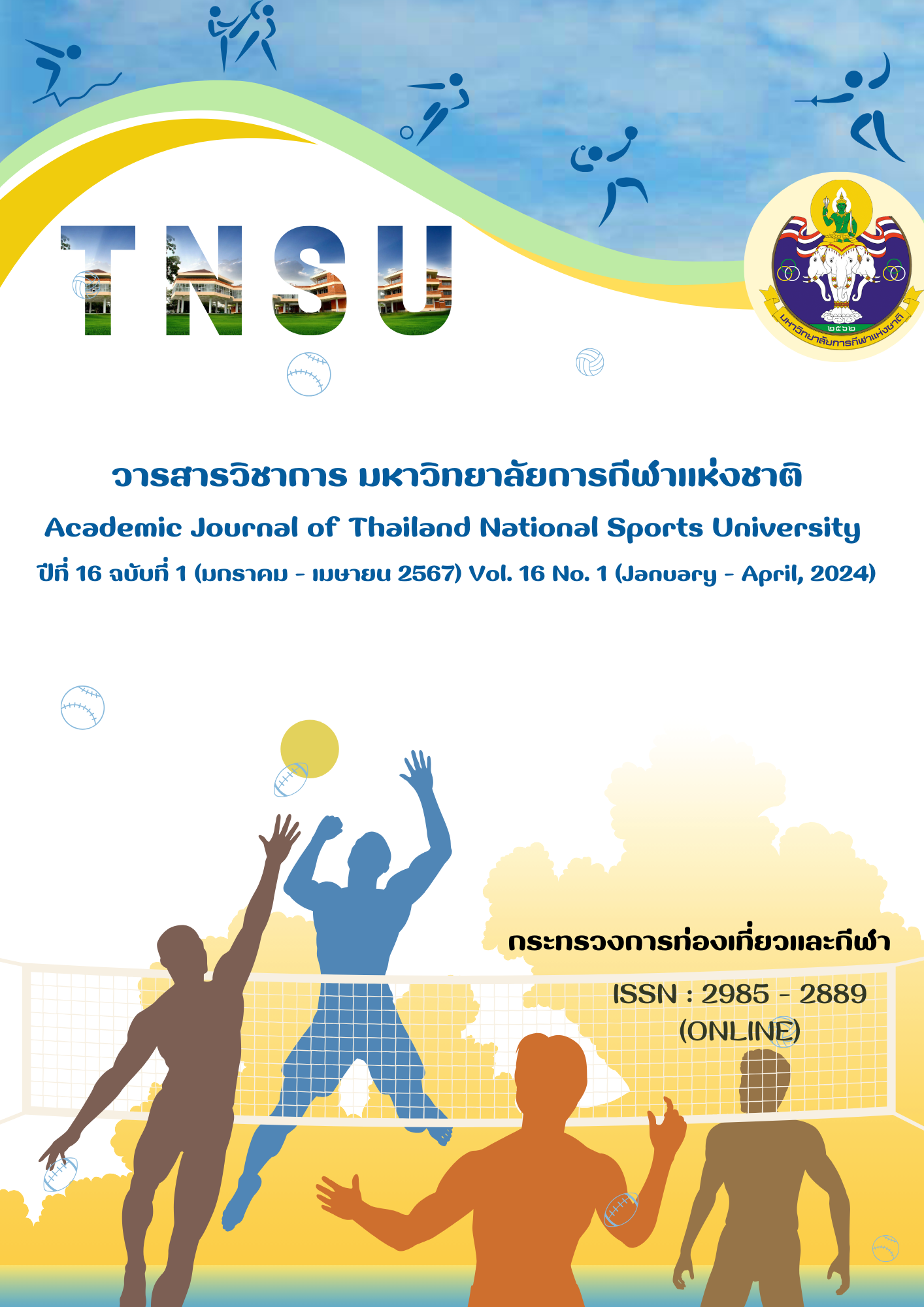DEVELOPMENT OF A TRAINING CURRICULUM FOR ENHANCING TEACHER PROFESSIONAL EXPERIENCE PRACTICE COMPETENCY OF BACHELOR OF EDUCATION PROGRAM STUDENTS MAJORING PHYSICAL EDUCATION AT THAILAND NATIONAL SPORTS UNIVERSITY
Main Article Content
Abstract
This research and development study aimed to study the following: 1) study the necessity of enhancing competency of pre - service student teaching practicum, and 2) to develop and evaluate training curriculum efficiency and 3) to study the effects of utilizing training curriculum for enhancing pre-service student teaching practicum competency of undergraduate students from the Bachelor of Education, Physical Education Major, Thailand National Sports University. The participants of the study included head of the program, instructors of Physical Education major and 136 relevant personals using stratified random sampling method, 20 specialists, and 60 major students using random sampling method. The research instruments included semi - structure interview and questionnaire. It will be divided into 3 phases: Phase 1 is to study the conditions and needs necessary for enhancing capability in the training profession. Phase 2 is to develop and inspect the efficiency of the training curriculum. Phase 3 is to study the effectiveness of the training curriculum through data analysis using mean and standard deviation while omitting the Priority Needs Index (PNI). The research findings were as follows: 1. The actual capabilities and needs of students consisted of 7 aspects, namely educational institution curriculum, learning management, measurement and evaluation of educational results, classroom management, innovation and classroom action research, the use of technology for education, and desirable characteristics. There is a need for enhancing capabilities in teaching profession training in 3 aspects: innovation and classroom research, measurement and evaluation of educational results, and the use of technology for education. 2. The results of the curriculum development found that there were 6 components of the training curriculum, namely objective principles for media training methods content, facilities, equipment, and measurement and evaluation. It was found that the curriculum was in the highest level, with an average of 4.59 and the standard deviation is equivalent to 0.22. The WBI model efficiencies (E1/E2) are equivalent to 81.52/80.78, higher than the specified criterion. 3. The results of using the training curriculum found that after using the curriculum, the experimental group's mean scores on knowledge, skills, and attitudes were significantly higher than the control group at statistically significant of level .05. The experimental group's mean scores on knowledge after using the curriculum were significantly higher than before the use of curriculum at a statistically significant of level .05.
Article Details

This work is licensed under a Creative Commons Attribution-NonCommercial-NoDerivatives 4.0 International License.
The published article is a copyright of the Academic Journal of Thailand National Sports University. The passage appeared in each article in this academic journal is a perspective of each author which is not related to the journal. Each author is required to be responsible for all components of his/her own article. If there are any mistakes, each author must be responsible for those mistakes on his/her own.
References
Cañadas, L., Santos-Pastor, M. L., & Castejón, F. J. (2019). Physical education teachers’ competencies and assessment in professional practice. Apunts Educación Física y Deportes, 139, 33 - 41.
Chaiyos Phaiwittayasiritham & Yuwaree Phonphanthin. (2016). Guidelines for research competency development. For student teachers: The complete needs assessment: Education Silpakorn University.
Hauer, J. & Quill, T. (2011). Educational needs assessment, development of learning objectives, and choosing a teaching approach. Journal of Palliative Medicine, 14, 503 - 508.
Jesus, V., & Daniel, M. V. (2013). Effect of internships on pre-service teachers’ conceptions of planning physical education. European Scientific Journal, 9(10), 253 - 261.
Krejcie, R.V., & Morgan D.W. (1970). Determining sample size for research activities. Education and Psychology Measurement, 30(3), 607 - 608.
Mehmet Yanlk. (2020). Preservice physical education teachers’ perceptions of competence in selecting teaching techniques: Teacher training in Turkey. Journal of Educational Issues, 1(6), 253 - 264.
Office of the National Economic and Social Development Board. (2017). Economic Development Plan and National Society, No. 12 (2017 - 2021). National Legislative Assembly. 2014. Royal Gazette. Retrieved from https://www.nesdb.go.th/ewt_dl_link.php?nid=6422
Onuma Rungruangwanichkul. (2013). The model development to enhancing researchers’ teacher in Secondary Education Service Area Office 2 by learning process Intergation (Doctoral dissertation), Srinakharinwirot University.
Paiyada Sangthong. (2015). Training curriculum development to enhance training competency. Teaching professional experience of graduate education students Department of Physical Education (Master’s thesis), Srinakharinwirot University.
Panida Sakuntanaga. (2018). Assessment of Necessary Needs to Develop Teacher Student Competencies According to the Framework R - TPac. Veridian E - Journal, Silpakorn University, 11(3), 57 - 73.
Surang Khowtrakul. (2013). Educational psychology (11th ed.). Bangkok: Chulalongkorn university.
Surasak Khetchaiyaphum, Jintana Sarayuthpitak, & Suthana Tingsabhat (2022). Physical activity training curriculum for enhancing well – being of the elderly. Academic Journal of Thailand National Sports University, 14(3), 103 - 114.
Suwimol Wongwanich. (2006). Research to assess the need for necessity. Bangkok: Chulalongkorn University Press.
Tissana Khemmanee. (2009). Science of teaching knowledge for developing an effective learning process. Bangkok: Chulalongkorn University.
Wanich Nirantranon & Sasithorn Nirantranon. (2009). The Trend of Pre-Service Physical Education Teacher in the Period of 15 Years (2008-2022). Medwell Publications, 4(6), 657 - 661.
Worasak Pianchob. (2018). Includes articles on philosophy, principles, teaching methods, and measurements for physical education evaluation. Bangkok: Chulalongkorn University.


